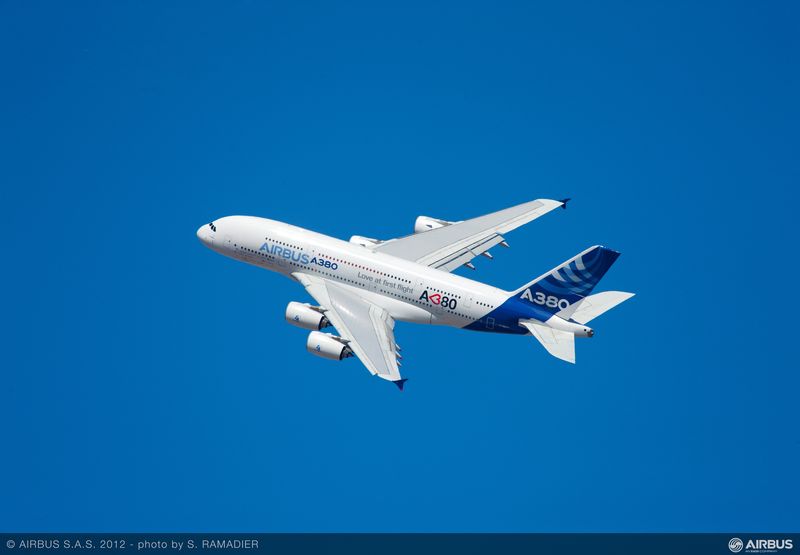Military
Airbus Backlog of $1 Trillion Makes Boeing Look Smaller Than It Is
Published:
Last Updated:

Of more interest perhaps is the company’s order book for the quarter and its backlog of orders for commercial planes. The company took new orders for 101 commercial jets in the first quarter of the year, about even with last year’s first quarter orders of 103. Gross orders for the quarter totaled 121, and a total of 20 orders were cancelled, 10 for the A320neo and 10 for the A321neo.
The Airbus backlog now totals more than 6,300 commercial planes, or more than 10 years of production at its current pace of around 625 new jets a year. The company reported Thursday that its order book value rose to €955 billion at the end of the quarter, compared with €858 billion at the end of December. The totals take into account a positive revaluation linked to the strong U.S. dollar and is given at list prices. At the current euro-to-dollar exchange rate, the order book value is about $1.07 trillion.
Airbus has beaten rival aircraft maker Boeing Co. (NYSE: BA) to be the first to reach $1 trillion worth of backlog. Boeing wrote a total of 116 net new orders in the first quarter of 2015, and the company’s backlog was just over 5,700 planes. On the company’s conference call last week, the chief financial officer said Boeing’s backlog was valued at $435 billion.
ALSO READ: Did Boeing Outsmart Airbus on Super-Jumbo Planes?
The difference between the two numbers is too wide to be a comparison between apples and apples. The likely explanation is that Airbus is calculating the value of its backlog on the basis of list prices and Boeing is calculating its backlog on how much the company actually expects to be paid. Neither company wants to make it easy for people to understand anything about their businesses.
In any event, all that’s at stake here are mere bragging rights, but the numbers are impressive. Only 15 countries had total GDP in 2013 that topped $1 trillion. Only 27 had GDP totals that were above $435 billion. Airbus and Boeing combined would rank 13th on the 2013 GDP list, ahead of Spain and behind Australia.
When Boeing reported earnings last week, the two numbers of particular interest to analysts were not the size of the company’s backlog, but the size of its deferred production costs on the 787 and the company’s cash flow. As it turns out, deferred production costs rose by $723 million to a total $26.9 billion, and free cash flow was negative for the first time in four years.
Sterne Agee estimated that deferred costs on the 787 program would total about $28.5 billion at the end of the third quarter of this year, and then remain stable for a couple of quarters before beginning to decline. That estimate looks pretty good now, given the first-quarter drop in deferred costs, and when the bleeding stops it will help Boeing meet its other goal — keeping investors happy.
To do that, Boeing needs to offset those deferred costs with dividends and buybacks, and to do that the company needs cash flow. There is general agreement that the company pulled revenue forward into the fourth quarter of 2014 in order to meet its projections, and that is what stifled first quarter cash flow. Boeing has reaffirmed its previous guidance of $9 billion in cash flow from operations, and that should help mollify investors at the annual meeting on Monday.
ALSO READ: 4 Dividends and Buybacks That Should Not Be Ignored
In the past fiscal three years, Boeing’s cash flow from operations has totaled $7.51 billion, $8.18 billion and $8.56 billion. Cash flow from operations in the first quarter totaled just $88 million. But Boeing reiterated its guidance for 2015 earnings and revenues, as well as its cash flow guidance, and continues to say that it will deliver between 750 and 755 commercial airplanes this year, up from the record 723 the company delivered in 2014.
Over the past three years, Boeing’s share price has risen more than 25% and its one-year gain is more than 16%. Year to date, the shares were up more than 13%, as of Wednesday night’s close.
Boeing’s shares traded down more than 1% in the mid-afternoon on Thursday, at $144.53 in a 52-week range of $116.32 to $158.83. The consensus price target on the stock is $162.32.
Want retirement to come a few years earlier than you’d planned? Or are you ready to retire now, but want an extra set of eyes on your finances?
Now you can speak with up to 3 financial experts in your area for FREE. By simply clicking here you can begin to match with financial professionals who can help you build your plan to retire early. And the best part? The first conversation with them is free.
Click here to match with up to 3 financial pros who would be excited to help you make financial decisions.
Thank you for reading! Have some feedback for us?
Contact the 24/7 Wall St. editorial team.